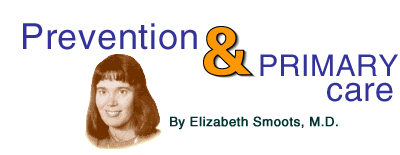
My interest in prevention began long before I became a doctor. Prior to graduating from medical school and specializing in family practice, I knew that I wanted to focus on preventive medicine.
It may have been because I grew up in a family that favored feasting on vegetables and fruits to snacking on chips and fries. It might have been the years of effort I put into weight lifting, going running with friends, and teaching aerobics classes. Or it may have been the time I spent growing an organic garden from scratch, reaping health benefits and pleasure as rewards. It might also have been the hours I spent poring over Prevention, reading the nutrition and fitness facts contained between the magazine's covers.
No matter how it began, one thing is certain: During my youth I developed a lifelong fascination with prevention. I followed that interest into college -- where I graduated with honors in biology -- and then went on to medical school. There I found that the specialty of family practice was most closely affiliated with preventive care. Educating patients to pay attention to their health before an acute illness occurred would be doing them a great service, I thought.
Upon completion of my training as a family physician, I entered private practice. There I saw firsthand the effect prevention, or lack of it, can have on people's lives. It was painful to watch patients come in with major ailments -- such as heart disease, cancer, or a stroke -- that might have been avoided or at least alleviated if tended to sooner. Yet I rejoiced each time a patient returned for a physical exam and was healthy -- then we could turn our efforts toward developing a personalized plan for prevention.
I found, however, that the traditional practice of medicine is overwhelmingly oriented toward drug treatment of illnesses, leaving little time for preventive care. Realistically, a doctor's rigorous schedule doesn't allow much time for helping people to stay healthy. After many years in private practice, I decided I wanted to spend more time dealing with prevention, and I turned to writing. I enrolled in several evening classes and honed my skills as a freelance nonfiction writer. Combining writing with part-time work as a family physician in various group practice and HMO settings, I made progress toward my goal of helping make preventive health information more accessible to everyone. I published articles in several magazines and found regular work as a medical editor and writer for a health and wellness newsletter.
During my 20 cumulative years in the medical field in university, private practice, and HMO settings, I have found that I keep returning to my work on prevention. Early in my career as a family doctor I wrote about prevention and primary care topics in a newspaper column and crafted educational health handouts for my patients.
Now I'm writing on the Internet, a tool with enormous potential to empower people by providing pertinent health information. The trouble is that we're constantly bombarded by medical news and information. How do you decide what is accurate, put in proper perspective, and a worthwhile use of your reading time? In this column I will draw on my experience and perspective as a family physician -- and my endless fascination with preventive medicine -- to help provide you with practical information about prevention and primary care.
Elizabeth Smoots, M.D., F.A.A.F.P., is a board-certified family physician in Seattle, Washington. A fellow of the American Academy of Family Physicians, Dr. Smoots specializes in prevention and primary care medicine.

